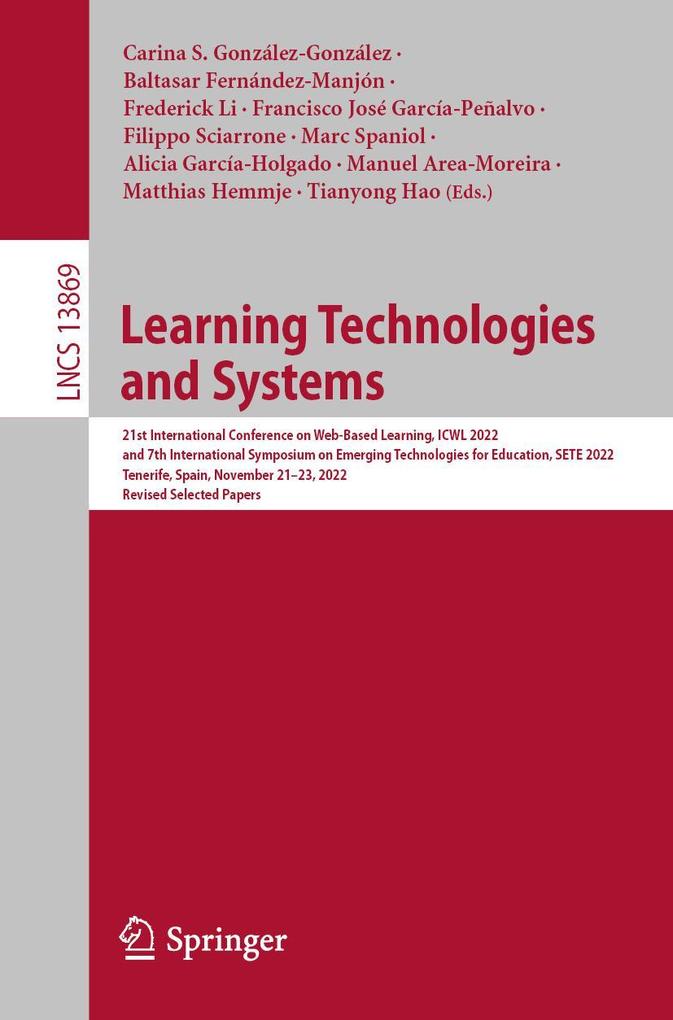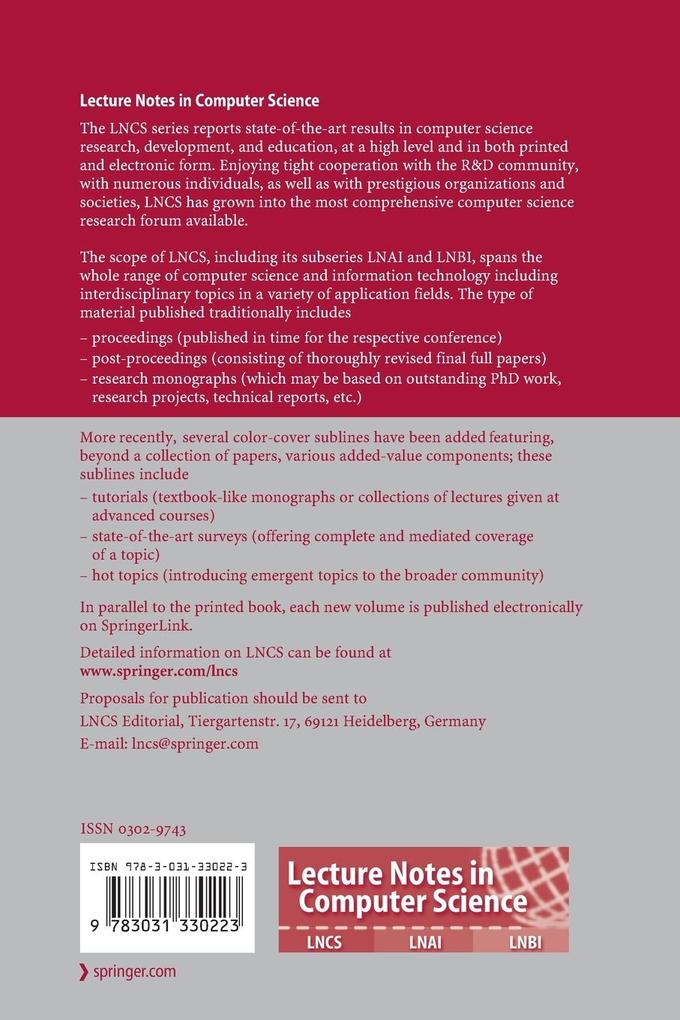This book constitutes the refereed conference proceedings of the 21st International Conference on Web-Based Learning, ICWL 2022 and 7th International Symposium on Emerging Technologies for Education, SETE 2022, held in Tenerife, Spain in November 21-23, 2022.
The 45 full papers and 5 short papers included in this book were carefully reviewed and selected from 82 submissions. The topics proposed in the ICWL&SETE Call for Papers included several relevant issues, ranging from Semantic Web for E-Learning, through Learning Analytics, Computer-Supported Collaborative Learning, Assessment, Pedagogical Issues, E-learning Platforms, and Tools, to Mobile Learning.
In addition to regular papers, ICWL&SETE 2022 also featured a set of special workshops and tracks:
The 5th International Workshop on Educational Technology for Language Learning (ETLL 2022), - The 6th International Symposium on User Modeling and Language Learning (UMLL 2022), Digitalization in Language and Cross-Cultural Education,
- First Workshop on Hardware and software systems as enablers for lifelong learning (HASSELL).
Inhaltsverzeichnis
ICWL 2022. International Conference on Web-based Learning. - Digital Divide, Local and Global? Surveying Augmented Reality Educational Usage in Europe and South America. - Gamifying Experiential Learning Theory. - The Learning Analytics System that improves the teaching-learning experience of MOOC instructors and students. - Intelligent Instructional Design via Interactive Knowledge Graph Editing. - A two-step process for analysing teacher s behaviors using a scenario-based platform. - New digital tools to teach soft skills and sustainability for the labor market: gamification as a tool for competency acquisition in realistic contexts. - Pocket English Master Language Learning with Reinforcement Learning, Augmented Reality and Artificial Intelligence. - : The design of an adaptive tool supporting formative assessment in data science courses. - Serious games for social problems. - Contextual Ontology-based Feature Selection for Teachers. - Automated Assessment in Computer Science: A Bibliometric Analysis of the Literature. - Can Educators Develop Digital Role-Playing Games? . - Constructing Low-Redundant and High-Accuracy Knowledge Graphs for Education. - Extracting the Language of the Need for Urgent Intervention in MOOCs by Analysing Text Posts. - Challenges in the Implementation of Web Based Digital Content Repository for Teachers in Bulgaria. - Providing Meaningful Digital Competence Assessment Feedback for Supporting Teachers Professional Development. - An Intelligent Chatbot Supporting Students in Massive Open Online courses. - Using a MOOC to Train Teachers to Design and Deliver MOOCs. - Designing a Game-Based Learning Environment for College students campus learning. - Towards a Metaverse of Knowledge: A Constructivist Proposition on Immersive Learning and Visual Literacy. - SETE 2022. International Symposium on Emerging Technologies for Education. - Acceptance evaluation of a serious game to address gender stereotypes in Mexico. - Learning experience design with Maker Education. - Mobile English Learning: A Meta-analysis. - 360° Tour as an Interactive Tool for Virtual Laboratories: A Proposal. - Wearable Devices for Smart Education Based on Sensing Data: Methods and Applications. - The Use of Verbs in International Chinese Language Education. - A tangible learning application from the 3D printer for the practical teaching of meat cutting in inclusive vocational education. - A New World of Open Space: Reflections and Perspectives of Chinese scholars on the digital transformation of education and future education research. - Game-based co-creation method for children and adolescents with medical complex disease. - A Deep Learning System to Help Students Build Concept Maps. - Flexible heuristics for supporting recommendations within an AI platform aimed at non-expert users. - The 5th International Workshop on Educational Technology for Language Learning (ETLL 2022). - Grammatical Strategies for Clause Combining and the Acquisition by Chinese EFL Learners. - Corpus-Based Sociolinguistic Study of Undergraduate English Writing and Its Implications for Business English Teaching. - Learner Portrait in Hybrid English Listening and Speaking Courses. - Conceptualizing a Gamified Flipped Model for English as Second-Language Classes in Secondary Schools: A Comparative Study between Different Age Groups. - Using Video Dubbing to Foster EFL College Students' English News Broadcasting Ability. - The 6th International Symposium on User Modeling and Language Learning (UMLL 2022). - Exploring Learning Engagement of Higher Vocational College Students in MALL. - Flipped data science classrooms with peer instruction and just-in-time teaching: students perceptions and learning experiences. - Using vicarious learning feedback videos as self-directed learning resources in a LMOOC context. - Blended Learning Approach in English Teaching: Effectiveness and Challenges. - Digitalization in Language and Cross-Cultural Education. - The Structure of Motivation in Online Translation Learning and the Role of L2 Motivation Self System. - Transediting of Children s Literature in the Age of Technology. - A Study on Knowledge Network Acceptability Facilitated by a Computer-Aided Translation Learning Platform. - On the Design of Computer-Aided Translation Teaching. - The Visualizing and Transferring of Communicative Rhetorical Modelling in Active Reading-Writing Teaching Based on Cognitive Apprenticeship: Case Analyses Facilitated by Rain-classroom and Pigai. org. - An Empirical Study on Knowledge-Network-Based Translation Learning. - Designing Blended Learning Model for Medical English Course Based on POA. - Application of the Formative Assessment Model in College English Course Assisted byDigital Platforms---Taking HFUT as an Example. - Translation Skills Training Through In-Depth Analysis: With Special Reference to Online Self-Learning on Textwells. - 1st Workshop on Hardware and software systems as enablers for lifelong learning (HASSELL). - A Theoretical Framework for Computer Vision Learning Environment.



































